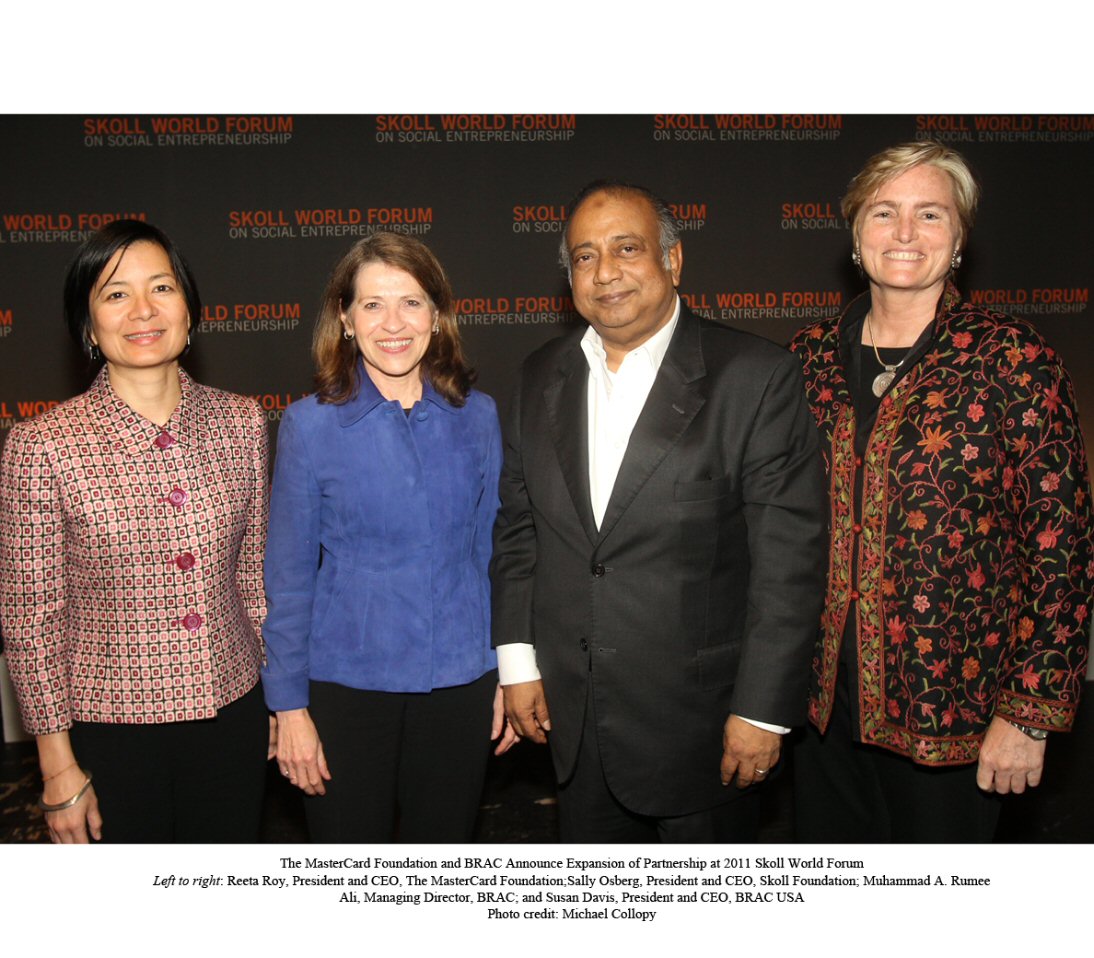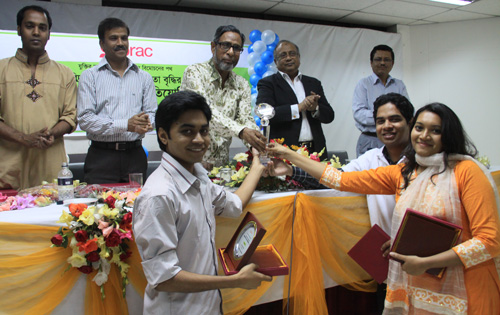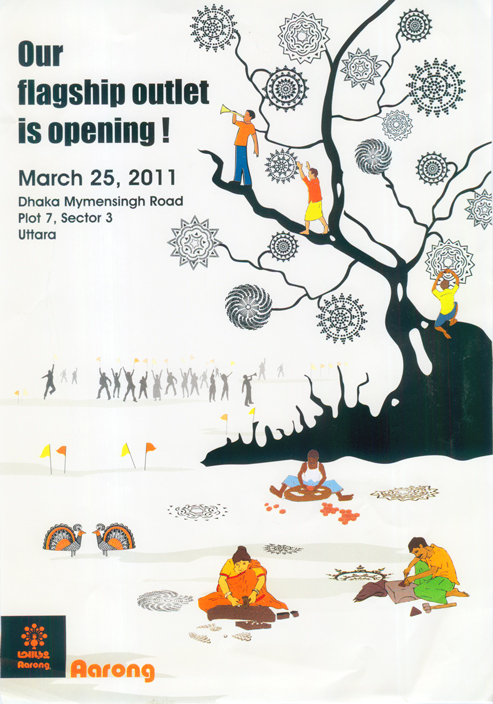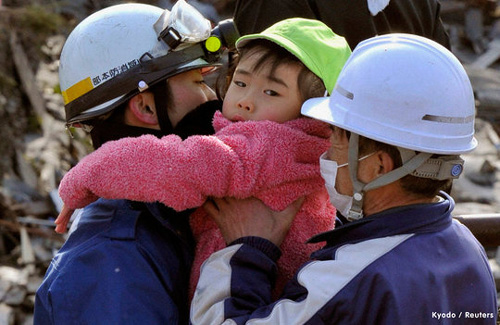
BRAC Wins IFTDO Global Award 2011
06 April 2011, Dhaka. BRAC has been awarded The Winner Award and a Certification of Merit at the IFTDO (The International Federation of Training & Development Organizations) Global Award 2011. ‘Medhabikash Uddyag’ of BRAC Education programme was awarded the winner award in the ‘Knowledge management category’ and ‘Active Citizen and Accountable Local Government (ACALG)’ component of BRAC Community Empowerment and Strengthening Local Institutions programme (CESLI) was awarded a certification of merit in the ‘People management category’. The awards will be presented on the 40th IFTDO World Conference to be held in Warsaw, Poland from 8th to 11th may, 2011.
Our Medhabikash Uddyog (Promoting Talent) is a scholarship programme where we target bright students from disadvantaged backgrounds and offer them financial support to help pay for tuition fees to continue their education and also provide training on English language and computer skills to help them in pursuing higher education. Our Active Citizens and Accountable Local Government (ACALG) project is an initiative which aims to create an environment for more active civic engagement among rural and semi-urban poor citizens and to strengthen capacities of local government in order to be more accountable and provide effective governance. The project builds capacity and provides training to local government representatives and female leaders and facilitates a forum for regular interaction.
The International Federation of Training & Development Organizations (IFTDO) is a world-wide federation (UK based) formed in 1972 to develop and maintain a world-wide network committed to the development and transfer of knowledge, skills and technology to enhance personal growth, human performance, productivity and sustainable development. Each year, IFTDO gives out awards to projects that have created changes in the lives of people and made a real difference.
BRAC launches interactive educational CDs

05 April 2011, Dhaka. “What the textbooks cannot explain properly, the videos can. The videos matching with the textbook contents clarify questions that are raised while reading the books. Various scientific phenomenons are visually displayed and the animations make learning a lot easier for me and my classmates.” These were the words of a young and confident Kothamoni, a seventh grade female student from Rashid Daohata High School, on the positive impact of the use of interactive videos for Computer-Aided Learning at her school.
On April 3, 2011, BRAC launched two interactive educational CDs for General Science and General Math for high school education in Bangladesh. These were the very first CDs that have been launched under the Computer-Aided Learning (CAL) programme of BRAC. Along with Kothamoni, the CAL programme is aimed at making learning interactive, fun and easy for students across Bangladesh. Funded by the Asian Development Bank (ADB), the CAL programme is growing progressively in various districts and sub-districts across the nation.
The Computer-Aided Learning Programme (CAL), one of BRAC’s post primary education initiatives, is an endeavor to make the textbook contents easier, interactive and stimulating. BRAC had first introduced CAL in 2007. The Post Primary Basic and Continuing Education (PACE) unit of BRAC’s Education Programme (BEP) had started this programme using computer as a tool for teaching. In 2007-08 PACE piloted this programme in seven schools of Mirzapur, Tangail equipping these schools with computers and multimedia. Recently, the programme has been expanded to fifteen schools in five districts (Comilla, Gazipur, Bogra, Hobiganj and Gopalganj).
The main objective of CAL is to move away from the teacher-centered classroom environment to a more interactive and engaging one. It also ensures conceptual clarity and better application of learning materials and aims to increase the teachers’ understanding of the lessons. CAL is an attempt to create self learning provision for both teachers and students and to familiarise the rural students and teachers with the modern computer technology. CAL provides multimedia classroom with power backup and offers training to the teachers and students on usage of Information and Communications Technology (ICT). It provides e-content that can be used in the classrooms, and also the e-content at BRAC initiated community libraries (Gonokendro).
Speakers at the event commented that CAL would help our education system get rid of the memorisation culture, which is in direct conflict with creative learning. They also remarked that by making science and technology easier to grasp through its easy and interactive teaching techniques, CAL will help Bangladesh meet the challenges of the 21st century better. It is also expected to reduce the school dropout rate, given that it will attract students to the easy and enjoyable form of learning.
The CDs were launched at the end of the event by Sir Fazle Hasan Abed, the Founder and Chairperson of BRAC. Sir Abed said that the launching of the first interactive, educational CDs was a long-awaited venture and it is going to be a key element in Bangladesh’s education system. However, he said that it is an initial step; the ultimate goal would be to convert the entire curriculum of Bangladesh to CDs and websites that can be accessed by teachers and students all over the country at their convenience. Only then, Sir Abed said, can the country reach its goal of becoming a digital Bangladesh. Finally, Sir Abed added that BRAC is helping the government to achieve the desired goals of education in Bangladesh; it is not working as a counterpart. The Executive Director of BRAC, Dr. Mahabub Hossain, added that BRAC would hold no proprietary rights of the CDs launched so that more and more copies of the CDs can be made and spread nationwide.
The Mathematics CD launched contains 31 lessons on 22 math concepts of the national textbooks of grades VI to X, while the Science CD contained all lessons of the national textbook of grade VI. Another interactive CD for high school English under the CAL programme will be launched very soon. These CDs will be available at all Aarong outlets, BRAC Education area level offices, and BRAC Training & Resource Centres.
BRAC and The MasterCard Foundation Announce the Expansion of their Partnership in Uganda
OXFORD, UNITED KINGDOM--(Marketwire - March 30, 2011) -
BRAC and The MasterCard Foundation today announced the expansion of a $45 million partnership to scale BRAC's innovative microfinance multiplied model in Uganda. The announcement, which was made at the opening plenary of the 2011 Skoll World Forum on Social Entrepreneurship, will enable BRAC to expand its network to 129 branches, benefiting more than four million Ugandans.
"The MasterCard Foundation aims to scale innovative microfinance programs in Africa to improve the lives of people living in poverty," said Reeta Roy, President and CEO of The MasterCard Foundation. "BRAC's holistic approach integrates microfinance and livelihood services to help women to become productive economically and build assets to benefit their families."
Today's announcement builds on an existing partnership with The MasterCard Foundation in Uganda, where BRAC's approach, which it calls "microfinance multiplied," increases the ability of poor clients to productively use microloans to augment their incomes and build their assets, as well as stimulate economic and social development within their communities.
"Through this expanded partnership with The MasterCard Foundation, BRAC will be able to deepen the outreach of our current microfinance and livelihoods program in Uganda and expand our network to 129 branches," said Fazle Hasan Abed, BRAC's Founder & Chairperson. "We will also be undertaking a series of long-term studies to assess impact of integrated approach to services on lives of clients, their families and their communities."
Uganda is a country of 30 million people. More than 60 percent of the population does not have access to financial services. The BRAC program will provide economically active women with loans, training and technical support to enable them to improve their livelihoods, particularly those in the agricultural poultry and livestock sectors. Additionally, the program will expand vocational and life-skills education for adolescent girls.
"The theme of the 2011 Skoll World Forum is Large Scale Change—ecosystems, networks and collaborative action," said Sally Osberg, President and CEO, Skoll Foundation. "This announcement by BRAC and The MasterCard Foundation is a great example of collaborative action, innovation, and entrepreneurship helping solve the world's most pressing problems."
About the Partnership
In October 2008, The MasterCard Foundation committed $19.6 million to enable BRAC to expand its microfinance multiplied program in Uganda, to open 51 branches and serve two million people. Among the objectives, was a strategic focus to help BRAC document the long-term impact of this multiplier approach in Africa.
Building on a shared commitment to learning and strengthening the field of microfinance, the partnership is also enabling BRAC to expand the capacity of its Uganda research and evaluation unit to undertake longitudinal studies investigating the effectiveness of BRAC's integrated microfinance and livelihoods model. This data set will allow BRAC to conduct sub-sector analyses on various aspects of its program. BRAC is also piloting a Poverty Score-card which tracks ten key poverty-related indicators among its clients and uses the cumulative scores to track long-term progress. The scorecard is embedded within the Management Information System and will capture data each time a member takes a loan over the next few years.
BRAC chose Uganda because of the opportunity to make an impact in a post-conflict country with high poverty rates and where 72 percent of the population has no access to formal financial services. Although Uganda has a competitive microfinance market, most microfinance providers are concentrated in urban areas. Seventy percent of employment in Uganda is based on agriculture. Most of the rural poor are small scale farmers and lack access to finance, agricultural inputs and markets. Uganda is also a young country where 78 percent of the population is under the age of 30. As such, there is an urgency to equip young people with skills to enter the workforce.
To date the program has demonstrated outstanding success, providing microfinance loans to approximately 110,000 borrowers, training and access to high quality agricultural inputs to 50,000 farmers, productivity enhancing services to 124,000 poultry & livestock rearers, and access to basic health services to more than 1.5 million people. BRAC is also empowering 32,000 adolescent girls and young people from poor and marginal households, providing them education, training and access to financial services.
Today's announcement of an additional $25 million will enable BRAC to build on this success by deepening the outreach of the current microfinance and livelihoods program and expand it by opening 40 new branches; improving skills and livelihoods options of young people across all program areas, including the expansion of the adolescent girls program; continuing to document and disseminate results on long-term program impact and implementing a sustainability plan that phases out Foundation funding in five years.

BRAC Development Institute holds talk about coping with economic crisis
29 March 2011, Dhaka. BRAC Development Institute (BDI) hosted a talk titled Coping with Economic Crisis: Evidence from Bangladesh and Elsewhere by Dr. Naomi Hossain, Research Fellow at the Institute of Development Studies (IDS), Sussex, on Sunday, 27 March, at BRAC University. Dr. Hossain is a political sociologist specialising in the politics of poverty and pro-poor public services.
This presentation summarised findings from qualitative community-level research on the effects of the global food, fuel and financial crises on the lives of poor people in Bangladesh, Kenya, Jamaica, Yemen, Zambia and the UK between 2009 and 2011. It explored the nature of the impacts on local economies and everyday lives, on the coping responses people have adopted in a range of locations and their likely longer term consequences, and on the sources of support poor people have been able to draw on in coping with global economic shocks over which they - and their governments - lack direct control.
The discussion suggested that the poor did not directly correlate their crisis with the global shocks; rather they were always in crisis. The presentation also focused on a lot of positive aspects of Bangladesh which has improved conditions from the past such as better infrastructure and better communication. Political issues contributing to the crisis, policies, the effects of well being and social reproduction during crisis and the responses of people were also discussed.
Engaging the youth: Addressing extreme poverty

22 March 2011, Dhaka. BRAC Advocacy Unit organised the ‘Inter University Debate Competition 2011’ on extreme poverty with the slogan ‘Juktir Aloke Khuji Daridro Bimochoner Poth.’ It was held from March 16 to March 20, 2011 at Shaheed Nurul Amin Khan (Memorial) Multipurpose Hall, BIAM Foundation, New Eskaton, Dhaka.
Our Advocacy Unit seeks to mobilise and raise awareness among youth towards the issue of extreme poverty. We organise quizzes, seminar and debates from grassroots to national level to address the issue. We have already reached 2.17 million school and college students. Now we have taken a step forward in engaging the university students. As future decision makers it is important for them to be aware of the ultra poor regions of the country.
The topic of the final debate was “Proper allocation of budget is the best means of alleviating poverty.” United international University (UIU) won the competition and Jagannath University was adjudged runners-up beating 14 other renowned universities of the country. Md. Riad Hossain from UIU was adjudged Best Speaker.
Dr. AAMS Arefin Siddique, Vice Chancellor of Dhaka University inaugurated the opening ceremony on March 16, 2011. M. Hafizuddin Khan, Chairman of Transparency International Bangladesh (TIB) and Former Advisor of Caretaker Government of Bangladesh were present as the Chief Guest. Muhammad A. (Rumee) Ali, Managing Director, Enterprises & Investments, BRAC graced the closing ceremony as the Chair. Dr. Asif Nazrul, Professor, Department of Law, University of Dhaka, and Sk. Mojibul Huq, Manager of BRAC Advocacy Unit was present as the special guests in the occasion.
The members of Youth Forum for Poverty Alleviation & Development (YFPAD)’ immensely helped us in organising and making the event a success. We strongly believe that engaging the youth in such national issues will bring about positive changes in the future.
International Conference on Entrepreneurship and Development
23 March 2011, Dhaka. Entrepreneurship lies at the heart of the development process. Micro-enterprises are now recognised as key means of generating employment and increasing productivity amongst the poorest segments of the society. In view of this perspective BRAC, IGC(International Growth Centre of London School of Economics), and iiG(Improving Institutions for Pro-poor Growth of Oxford University) are going to organise a two-day International Conference on Entrepreneurship and Development: Experience, Practices and Policies on 27-28 March 2011 at BRAC Centre Inn in Dhaka, Bangladesh. The conference will focus on evaluations of current programmes designed to promote entrepreneurship in order to transform the economic lives of the poor. Central to this discussion will be an evaluation of the BRAC ultra poor programme that aims to transfer assets and business skills to the very poor. This programme is being implemented on a wide scale in Bangladesh and its being replicated in a growing number of developing countries. Recent results suggest that it has the potential to become a major tool in the global fight against poverty. The ultra poor model will be discussed in-depth, providing specific insights for policymakers looking replicate its success in other countries. Other presentations will provide new ideas on how constraints on entrepreneurship at the micro-enterprise level can be relaxed, particularly in the areas of training and access to credit.
The conference will also focus on policies to promote entrepreneurship and productivity improvements in larger firms. Presentations will discuss frontier knowledge on how state-level policies, firm capabilities, and trade interact to promote industrial development. There will be a particular focus on how trade policies can engender industrial development and on how the capabilities of firms to innovate and become more productive can be enhanced.
The outcome of the conference will be particularly relevant for developing countries targeting manufacturing and service sector expansion as a means of promoting economic growth, and there will be ample space dedicated to promoting dialogue and exchange of ideas.
Discussion: Government spending on poverty reduction
24 March 2011, Dhaka. BRAC and Centre for Policy Dialogue (CPD) jointly hosted a discussion on “Resources for the Ultra Poor in the National Budget: How Much? How Effective?” on March 23, 2011 at the BRAC Centre Inn Auditorium.
The main objectives of the dialogue were to provide a set of recommendations to increase the efficacy of fiscal measures and public service delivery to the ultra poor, to enhance implementation of existing pro poor policies and identify future policy priority areas for reducing ultra poor in Bangladesh.
Dr. Muhammad Abdur Razzaque, Minister for Food, Disaster Management and Relief was the Chief Guest of the discussion.
Click here to read more: http://www.thedailystar.net/newDesign/news-details.php?nid=178896
Aarong to launch flagship - country's largest store

24 March 2011, Dhaka. Aarong, the country’s leading fashion and lifestyle brand, will open its flagship store on the Dhaka-Mymensingh Road in Sector 3, Uttara on March 25, 2011. At 36,000 sq. ft., the outlet is currently the country’s biggest retail store. Aarong, an enterprise of BRAC, supports the livelihoods of approximately 65,000 rural artisans, of whom 85% are women.
Now in its 32nd year of operation, Aarong began conceptualising the design and building of its flagship store five years ago, in an effort to consolidate its brand image and present itself on a platform of global standards. The flagship store therefore aims to fully capture the Aarong brand and act as a projection of the brand’s positioning.
Every aspect of design, starting with the customised plans for the building to internal layout and decor, has been made to fit international retail industry standards. Visual merchandising elements inside the outlet have been professionally designed following scientific guidelines. Nakshikantha has been chosen as the overall theme for the store, to reflect Aarong’s pioneering role in the revival of this unique Bangladeshi craft.
Spanning the north wall of the building is Aarong’s Tree of Life – in which Aarong’s story is interwoven with the many thousands of stories of the family of artisans. The network of roots and branches of the tree is in fact an image of the rivers of Bangladesh. The motifs that form the tree use unique Nakshi Kantha patterns shaped from natural elements - metal, wood, clay and leather - indigenous to the work of our artisans. The outlet features six levels, each of which highlights one or more of these elements, with dedicated segments for clothing, accessories, leather and metal, books and stationery, toys, household products and much more. New features introduced include an exhibition gallery, a floor dedicated to exclusive product offering, a premium customer lounge and a newly-branded Aarong café in the flagship store.
The outlet will be inaugurated by Sir Fazle Hasan Abed, Founder & Chairperson, BRAC, Muhammad A. (Rumee) Ali, Managing Director, BRAC Enterprises and Tamara Abed, Director, Aarong. Senior officials from Aarong and BRAC will also be present.
Microcredit Summit lauds BRAC
16 March 2011, Dhaka. BRAC in Bangladesh received a certificate of appreciation from Microcredit Summit Campaign (a project of RESULTS Educational Fund). The certificate was presented in appreciation of BRAC’s commitment to the Summit’s goals.
The Microcredit Summit Campaign launched the State of the Microcredit Summit Campaign Report 2011 on March 7, 2011 in Washington, D.C. According to the report, more than 128 million of the world’s poorest families received a microloan in 2009- an all time high. The certificate is a validation of BRAC’s role in this achievement.
BRAC is an active member of the Microcredit Summit Campaign.
Praying for Japan
19 March 2011, Dhaka. As you all know by now, Japan was hit by a 9.0 magnitude earthquake, one of the largest earthquakes ever recorded, on Friday, 11th March, 2011. It also triggered a massive 23 foot (7 meter) ferocious tsunami killing thousands of people, as it swept away boats, houses, and cars, while widespread fires burnt out of control. The earthquake was followed by more than 50 aftershocks so far, many of them more than magnitude 6.0, and reaching up to Hawaii and other US west-coast areas. 
Photo Copyright © Kyodo/Reuters
We join the Japanese in prayer and in sympathy at the losses suffered by its people.
Join the world’s biggest family




